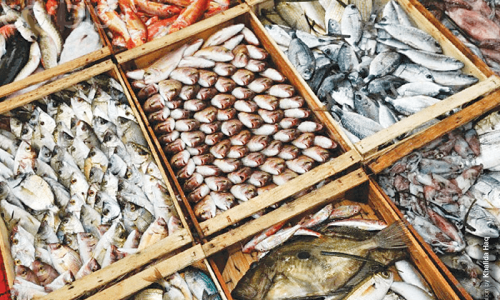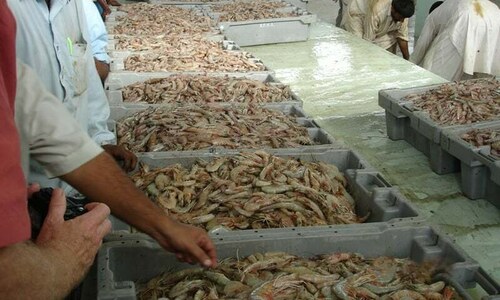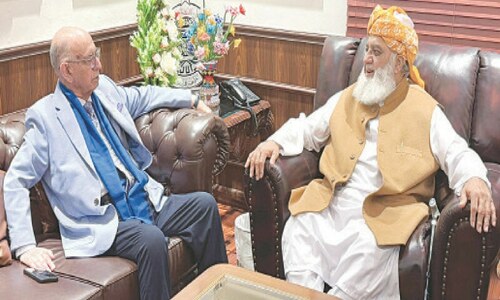KARACHI: The impending visit of an American delegation to review the installation of turtle excluder devices (TEDs) in shrimp-catching nets has prompted stakeholders, fisheries departments, and others to take action, addressing a problem that has persisted for years.
Pakistan’s shrimp exports to the US has been banned since 2017 because fishermen were not using the TED in their nets, endangering turtles.
Like other countries around the globe, the US also considers turtles an endangered species, and in 2017, Washington suspended shrimp imports from Pakistan imposing a condition of TED installation in shrimp-catching nets.
TEDs are metal devices consisting of bars and mesh inserted into a trawl net’s neck. Shrimp can pass between the bars and reach the back of the net, while larger species like turtles bump against the metal grid and exit through a mesh flap. Stakeholders believe that Pakistan has missed out $150 million in annual exports to the US.
Pakistan missing out on $150m annual revenue; communication gap, lack of will blamed for TED underuse in shrimp nets
A senior official at the Fishermen Cooperative Society (FCS), Ahmed Yousuf Bhatti, attributed the insufficient use of TEDs in shrimp nets to a communication gap between stakeholders, government departments, and a lack of enthusiasm among fishermen.
While some issues remain unresolved, stakeholders and fishermen are now making efforts to comply with the US’ requirement to install TEDs in shrimp-catching nets within the next three to four months, aiming to revive shrimp exports to the US.
Mr Bhatti said fishermen were previously reluctant to take the risk of fetching low prices for their shrimp catch and paying higher fuel prices for their sea journey.
He claimed, “Things have changed in the last one and a half months, such as the fast-track training of fishermen at the FCS, assuring them that it will be a win-win situation for both them and the country in terms of fetching foreign exchange.” Fishermen would also be trained in the high sea.
He said, “We have also introduced a lightweight aluminum-made TED last week, priced at Rs13,000-14,000, replacing iron-made devices.” Two to three vendors are manufacturing new TED, and efforts are underway to finance the device by the FCS and Trade Development Authority of Pakistan (TDAP). Iron-made TED lacks long life and tears the net, while durable aluminum-made TED would last at least two years.
“We expect an American delegation to visit for a review of TED installations within the next three to four months, during which we are working on creating awareness, providing training, and financing TED for the fishermen to achieve results,” Mr Bhatti hoped.
Patron in Chief, Sindh Trawler Owners and Fishermen Association, Sarwar Siddiqui said, “We need to install TED as per law devised by the US to get clearance for shrimp exports. Relevant government departments and the stakeholders are now trying hard to convince fishermen to use TED.”
Fishermen were of the view that big fish get stuck in the mouth of the net where TED is fixed or installed at the net, making fishing trips financially unfeasible, he said.
Managing Director Karachi Fish Harbor Authority (KFHA), Zahid Khemtio, said it has been noticed that fishermen remove the device from their nets during open-sea fishing. The major issues are compliance in open sea waters and the non-availability of proper TED specifications in the local fishing industry.
The Livestock and Fisheries Department has directed the strict implementation of TEDs on shrimp trawlers, and fishing permits won’t be issued without TED installation.
In the first phase, the Marine Fisheries Department (MFD), KFHA, and Fishermen Cooperative Society Limited (FCSL) provided training to boat captains on TED use and installation from Dec 6, 2021, to Feb 25, 2022. A total of 950 captains received certification from MFD.
In 2023 (second phase), Mr Zahid mentioned that MFD/KFHA initiated another TED installation/fixation training programme from Aug 1, 2023, to Aug 29, 2023, during which 234 boat captains received training for TED installation.
Published in Dawn, October 21st, 2023














































Dear visitor, the comments section is undergoing an overhaul and will return soon.